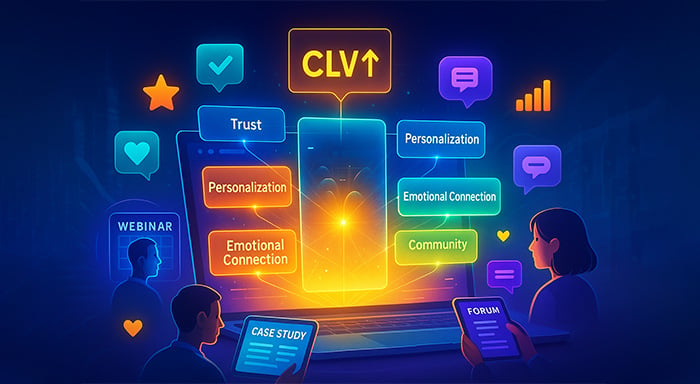A robust e-commerce website goes beyond selling items online in the rapidly developing modern world. Crafting a smooth, interactive, and user-centric shopping experience is the key to enhancing customer retention and gaining credibility. In the plethora of e-commerce websites, standing out from the crowd to grab the customer's attention is not about offering powerful products and intuitive designs. It makes possible cohesive websites that make every step of the shopping experience fun, seamless, and personalised, ultimately enhancing user experience.
An integrated e-commerce website is not just about a simple product listing page. Essentially, it refers to a well-organised machine that interconnects a wide range of features, tools, and backend processes to deliver a cohesive, user-friendly experience. In this article, you will learn how a thoroughly designed e-commerce website can improve customer satisfaction. Additionally, explore the key components required to make a fully integrated website and how the Elementor platform contributes to achieving this goal.
The Importance of Customer Experience in E-commerce
Customer experience (CX) refers to the overall experience a customer has while interacting with a business, from the first visit to the website to the post-purchase phase. CX is becoming a crucial aspect for e-commerce businesses that decide whether the lead becomes a loyal customer or looks out for other competitors. Research shows that customers often buy from a website that is easy to use, personalised, and hassle-free. A positive customer experience can enhance customer satisfaction, foster sales, and increase the chances of long-term repeat purchases. Hence, creating a smooth, cohesive experience is not just an option—it becomes a necessity for businesses to stay agile in the competitive market of e-commerce. To address this, many brands now extend their online presence beyond the browser by leveraging no-code website to app solutions, enabling a more native, performant browsing experience on mobile devices.
What Makes an E-commerce Website Integrated?
An integrated website allows connected tools, features, and systems to work together to provide a streamlined and harmonious customer experience. There are some methods to achieve this smooth integration:
- User-Friendly Navigation
One of the key elements of integrated websites is their simplicity and efficiency in navigation. With user-friendly navigation, users can easily and promptly find what they are looking for on the website. Effective navigation should have clear product categories, a hassle-free checkout process, and easy-to-use filters. This system streamlines the overall shopping process from product discovery to final purchase without hassle.
- Cross-Channel Consistency
Integrated websites maintain a consistent experience across all platforms, whether it’s desktop, tablet, or mobile. Customers expect the same high level of service regardless of the device they use. Cross-channel consistency ensures that customers can start shopping on one device and seamlessly switch to another without losing their cart or having to re-enter information.
- Personalization and Recommendations
Personalisation is a vital aspect of improving the customer experience and loyalty. An integrated e-commerce website offers personalized product suggestions by scraping data from a vast amount of data sources. This may include browsing patterns, previous purchase history, and customer preferences.
- Optimized Performance and Speed
An integrated website is also optimized for performance. Slow-loading pages and glitches can significantly detract from the user experience. A speedier website can increase the likelihood of accessing it by potential customers, ultimately enhance customer experience and improve search engine rankings.
- Payment and Checkout Integration
A seamless, effective, and secure checkout process can significantly boost the customer retention rate. An integrated payment gateway provides various methods to pay, including credit card, PayPal, Google Pay, or more options, allowing users to choose their preferred methods. A smooth, secure, and efficient checkout process is essential for customer retention. A well-integrated checkout system minimizes friction and reduces the chances of cart abandonment.
- Inventory and Order Management Systems
Efficient inventory and order management are critical for delivering a good customer experience. Integration with back-end systems ensures that stock levels are updated in real-time and customers are notified if products are out of stock or unavailable. This integration enables businesses to avoid the customer frustration of buying the product that is not available at the store.
Read Also: Get_ready_bell:client_pulse Explained: Strengthen Client Satisfaction with Real-time Insights
The Role of Web Builders in E-commerce Integration
While it’s clear that integration is essential for improving customer experience, many e-commerce store owners struggle with creating a seamless, functional website that meets all their needs. This is where web builders like Elementor come into play.
Elementor refers to a robust drag-and-drop web page builder designed for WordPress that streamlines the integrated e-commerce website creation process. It helps developers to build visually compelling and highly functional websites with less or no coding skills. Whether you are a startup business owner or an experienced e-commerce retailer, Elementor offers the tools required to enhance customer experience. With this comprehensive platform you can easily create an integrated website that meets with customer demand in today’s e-commerce world.
Elementor: A Powerful E-commerce Website Builder
Elementor is a highly flexible and feature-rich platform that offers a wide range of design and functionality options. In the e-commerce industry, it offers customized widgets and templates that help users create intuitive product pages, optimise the overall performance, and combine payment gateways. Elementor allows businesses to design visually stunning and along with highly competent pages with ease.
The Powerful e-commerce website builder capabilities of Elementor enable users to integrate WooCommerce (the most popular e-commerce plugin for WordPress) seamlessly. This integration can enable businesses to manage everything in one place, from listing products to payment and shipping, directly from the websites. Elementor’s drag-and-drop interface ensures that even those with minimal web development experience can create a fully functional and aesthetically pleasing e-commerce site.
Furthermore, Elementor provides advanced customisation capabilities that allow businesses to build a website that meets their brand voice. Whether you're aiming to modify the layouts, fonts, and colours, this platform gives you total control over the design.
This level of flexibility makes Elementor a reliable option for creating integrated websites that ensure a smooth customer experience.
Specialized Hosting for Online Stores
While web builders like Elementor provide the tools to create integrated websites, choosing the right hosting solution is equally important. The speed, reliability, and scalability of a website largely depend on the hosting provider. For an e-commerce website, specialized hosting solutions are designed to ensure optimal performance, security, and uptime.
Specialized hosting for online stores provides the necessary infrastructure to handle high traffic volumes, secure sensitive customer data, and ensure fast load times. Unlike other standard websites, e-commerce websites frequently require additional resources for providing real-time stock updates and seamless payment processes. Along with a secure integration with their third-party system, like customer service tools and shipping providers.
Hosting providers that specialize in e-commerce offer benefits such as:
- Enhanced Security
Security is paramount for online stores, especially when dealing with sensitive customer data. E-commerce websites use sophisticated hosting services like firewalls, SSL certificates, and other security services to safeguard customer information and build trust. - Scalability
As your online store grows, your hosting needs will evolve. The specialised hosting services integrated with your business make your website able to handle traffic which increases in high seasons without crashing. - Faster Load Times
Speed is critical for customer experience. The integration of specialised hosting services enables e-commerce websites with fast loading speed, boosts conversion rate, and lowers bounce rate. - 24/7 Customer Support
E-commerce websites can experience issues at any time, and having reliable support is crucial. Specialised hosting providers offer round-the-clock customer service to help resolve issues quickly. - Automatic Backups and Updates
Ensuring your website is backed up and up-to-date is vital for maintaining a reliable e-commerce experience. Specialised hosting solutions usually come with automated updates and backups, eliminating the risk of data loss and guaranteeing the website runs seamlessly.
Choosing a specialised e-commerce hosting provider is crucial for business owners that allows them to focus more on growing their online stores. While the other technical terms of hosting and their performance are managed by experts.
Advantages of Integrated E-commerce Website
Enhanced User Experience
An integrated website can enhance overall customer experience by offering a smooth and coherent shopping journey. Its easy navigation, prompt checkout process, and tailored recommendation features are responsible for a positive user experience. Therefore, this integrated website ensures that the stored product information is precise and updated, which significantly lowers the likelihood of customer dissatisfaction.
Increased Conversion Rates
An integrated e-commerce website can increase conversion rates by streamlining the buying process. The simple and easy-to-use navigation, clear product information, and seamless checkout process of a website encourage customers to make a purchase. For customers, this integration allows them to get real-time shipping updates and access the order history, in essence boosting the repeat purchase rate.
Scalability
An integrated website is built to scale with your business. As your product offerings grow or your customer base expands, an integrated e-commerce website can adapt to these changes. This level of scalability is crucial for businesses that aim to grow and expand in the future.
Enhanced Data Insights
With the integration of back-end systems, like stock management and analytics tools, customer relationship management (CRM) offers meaningful data insights. These insights are helpful for businesses to determine and improve outreach strategies, customer service, and product availability.
Enhanced Brand Consistency
Consistency across all customer touchpoints—whether it’s your website, email marketing campaigns, or social media—is crucial for building brand trust. An integrated e-commerce website enhances your brand’s reliability and recognition through constant representation across all digital platforms.
Final Thoughts
In today’s rapidly growing e-commerce world, offering a smooth and integrated customer experience is essential to succeed. From simple navigation and tailored suggestions to seamless checkout gateways and cross-platform consistency. This integrated website is designed to provide a positive and enjoyable shopping experience in the entire customer journey.
Platforms like Elementor, with its powerful e-commerce website builder features, make it easier than ever for business owners to create visually appealing and functional e-commerce websites that integrate essential tools for improved customer experience. Moreover, specialised hosting services for online e-commerce stores guarantee that your website functions faster, securely, and coherently.
Website integration allows businesses to offer a great customer experience that not only grabs user attention but also enhances retention and repeat purchases. An integrated e-commerce website is not just a business component—it is a critical tool to stay competitive in the digital marketplace.








